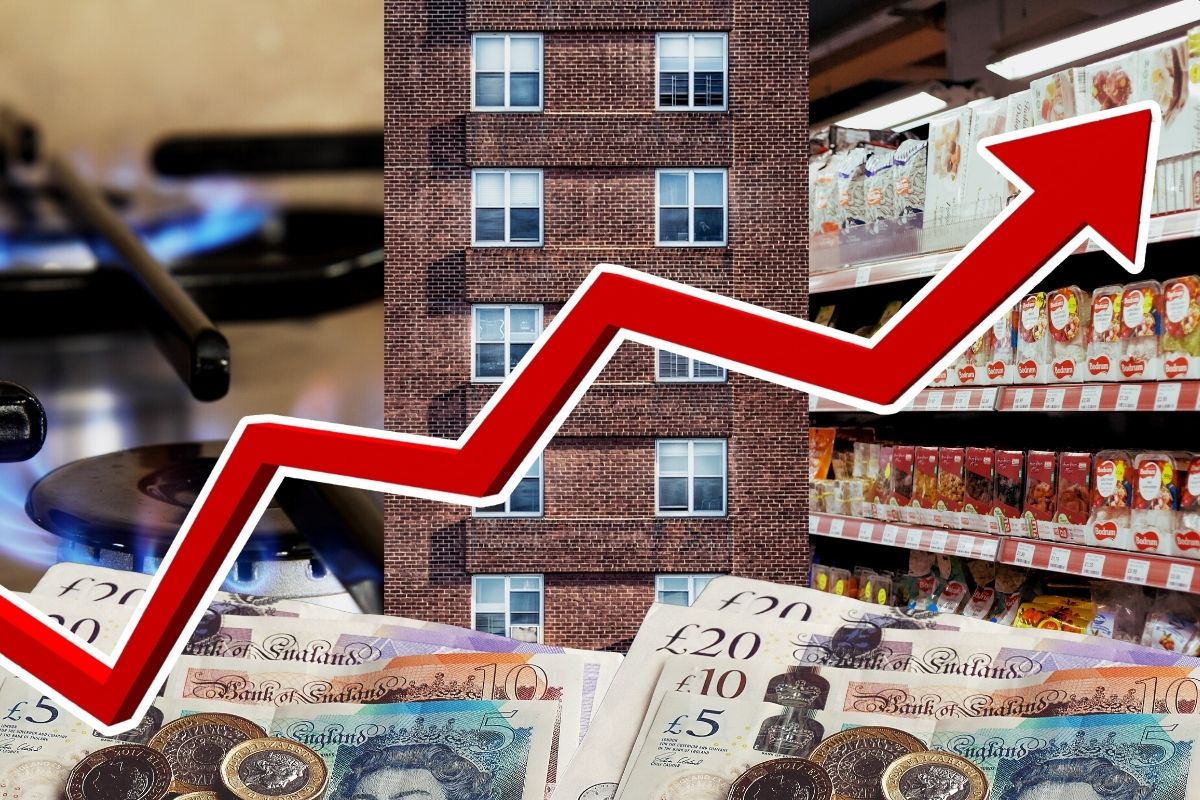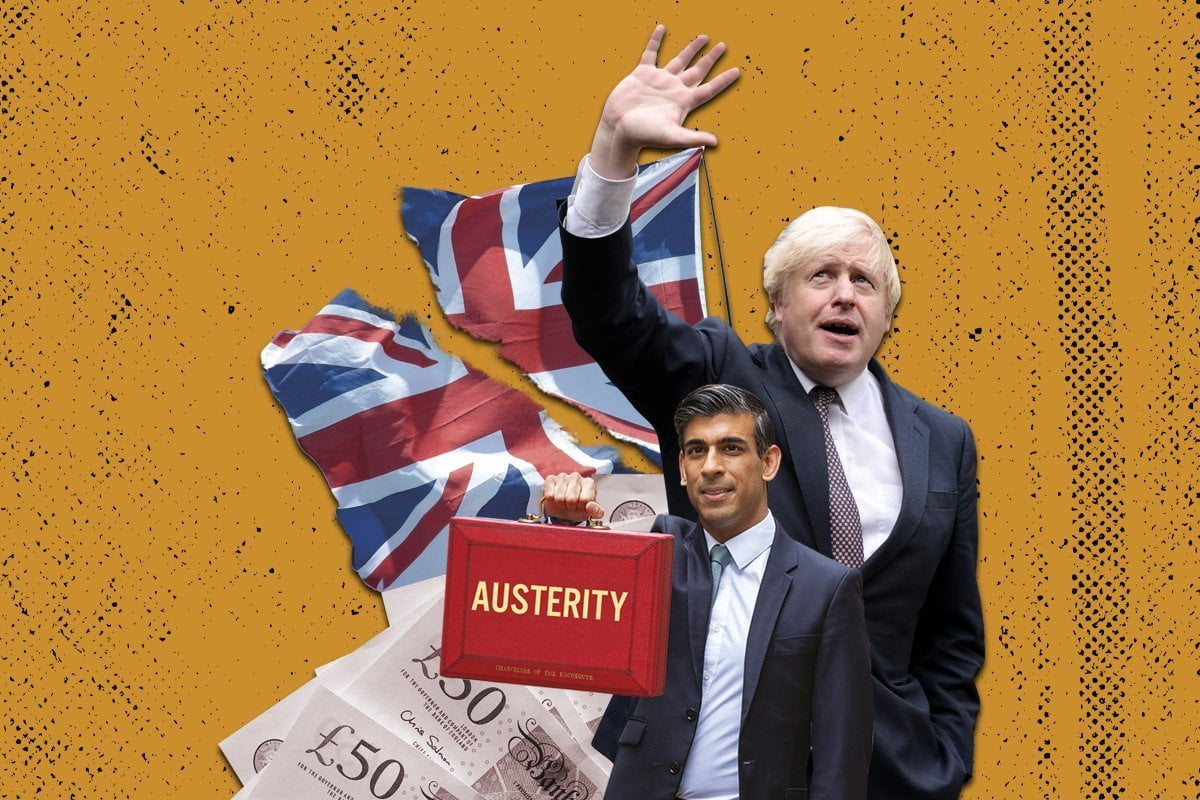Whilst Boris Johnson and the Tories are gripped by political crises, the working class is suffering from a huge squeeze in living standards, due to surging inflation and years of austerity. This is creating the conditions for explosive events.
The political crisis enveloping Downing Street is fuelled not only by Boris Johnson’s endless lies, but by an economic backdrop of misery for workers and the poor, who face a collapse in living standards.
Revelations around illicit lockdown parties could yet see the Prime Minister forced to resign, with many Tory MPs already sharpening their knives.
But even if Boris goes, whoever replaces him would face the same deepening crisis of British capitalism, which is paving the way for revolutionary explosions.
Whatever Johnson’s fate, therefore, a period of heightened instability and intense class struggles lies ahead.
Sick man of Europe

At the start of the year, before the latest wave of Tory scandals emerged, Boris Johnson was hubristically heralding the return of crown stamps to pint glasses as one of his “key successes”. Under this government, whilst drowning our sorrows, we can now gauge our misery in terms of pounds and ounces.
“And from Singapore to Switzerland, we’ve negotiated ambitious free trade deals to boost jobs and investment here at home,” stated Johnson in true bombastic fashion. He is like the man who lost a pound but was delighted he found a penny!
Looking ahead to 2022, Johnson had the effrontery to pledge that his government would go “further and faster” to maximise the “freedoms” of Brexit.
This rank foolishness is a stark reflection of how out of touch this Tory clique of rogues running the country has become.
The UK economy is in fact in a dire position, where productivity and investment are falling. Britain is continuing to fall behind its rivals – a veritable sick man of Europe.
Any apparent rebound in our economy is because it has suffered a deeper decline, yet to recover its 2019 level.
Given the uncertainties, economists are already busy revising down their forecasts for 2022. According to government sources, from 2023, the UK economy is set to grow each year by 2.1%, 1.3%, and 1.6% respectively.
But even this is far-fetched, given the present deterioration, where we are facing two quarters of negative growth – that is, a new recession.
Damage and disaster
Rather than ‘freedoms’, the new border checks and red tape introduced by Brexit will result in permanent damage to an already enfeebled British capitalism.
According to the Office of Budgetary Responsibility, the UK economy will be 4% smaller as a result of the loss of European markets.
As of October (the latest figures available), the imports and exports of goods were 15.7% below the level expected had the UK not left the EU’s customs union and single market. Export of services were down by 30% on two years earlier.
Reflecting the chaos, cheese manufacturer Simon Spurrell asserted that Johnson’s deal was “the biggest disaster that any government has ever negotiated in the history of trade negotiations”.
This blows apart Boris Johnson’s glowing rhetoric. At the same time, it would be foolhardy to imagine that remaining in the EU would be an answer to workers’ problems in Britain. On the contrary, given the global capitalist crisis, workers across Europe are also under the cosh.
Sinking ship
The ever-pervasive problems of British capitalism are certainly having profound effects at all levels, including within the government.
The rats are already abandoning the sinking ship, with Lord Frost – the political illiterate who oversaw Brexit – departing from his ministerial position at the end of last year.
Like the proverbial bull in a China shop, Frost attempted to tear up the EU-UK protocol, creating more instability and potential chaos in the process. But even in his absence, the question of Europe, and particularly the border in Ireland, will continue to haunt the Tory government.
Ex-Downing Street advisor Dominic Cummings, meanwhile, is keen to keep the pot boiling when it comes to damaging revelations concerning his former boss.
No doubt Cummings – who knows a thing of two about flouting lockdown restrictions – has his own axe to grind. Nevertheless, his drip-feed of insider information has lifted the lid on the cesspit of lies and corruption at the heart of government. And this, in turn, has brought all the tensions within the ruling class bursting to the surface.
With the Conservative Party slumping in the opinion polls, a mutinous mood is spreading amongst Tory backbenchers, who are rapidly turning on their disgraced leader.
Many of these MPs, especially in former ‘Red Wall’ seats, were elected on the back of the Tories’ thumping 2019 election victory. But with large numbers of voters abandoning the party, and constituents airing their anger and disgust over the #Partygate affair, these same MPs are losing patience with Johnson.
✍️ Analysis | The polling situation for the Conservatives is worse than you think
Read: https://t.co/9i6feEXbx0 pic.twitter.com/lMzgvU6Son
— Britain Elects (@BritainElects) January 14, 2022
All of this comes on top of a string of broken promises, not to mention a bungled attempt to protect Owen Paterson, which not only forced Tory MPs into an embarrassing U-turn for the sake of saving their former colleague, but which also ended in electoral disaster in Paterson’s North Shropshire constituency.
It is clear, therefore, that the wheels are falling off for the Tory Party, leading to splits, divisions, and a crisis of the whole political regime.
Levelling down

While Lord Frost can return to the plush benches of the House of Lords, however, the working class cannot escape this unfolding nightmare of falling living standards.
Inflation, already running at over 5%, is set to get much worse, with three-quarters of company directors expecting costs to rise in the next 12 months.
One recent survey of economists by Reuters predicted that the latest official UK inflation figures, set to be released tomorrow, could reach 5.2% – the highest level in 30 years.
Paul Dales, chief UK economist at Capital Economics, meanwhile, expects inflation to rise to almost 7% in April, when the energy tariff price cap is increased by Ofgem, in response to a global gas shortage.
But it is not just soaring energy costs that are leading to surging inflation. Across the board – from housing, to transport, to food and drink – prices are rapidly going up.
This situation has been described by many as a ‘cost of living catastrophe’, meaning big cuts in real wages for millions of workers – especially the lowest paid.
At the same time, welfare cuts are biting and National Insurance increases are set to kick in, leading to a massive squeeze for millions of households.
While the working class is ‘levelled down’, however, the rich are laughing all the way to the bank. This is especially the case for Tory donors, who have been awarded juicy government contracts, pocketing millions in the process. There is now a veritable chasm between the classes.
Workers have been repeatedly told to tighten their belts. But this is no longer possible, with prices going through the roof. Millions of workers will now have no choice but to refuse this deterioration in their living standards and fight back.
Under pressure
Her Majesty’s official ‘opposition’ of Sir Keir Starmer and co. have little to offer. They have fully embraced the discredited creed of Blairism, which is synonymous with capitalism.
They fall over themselves to prove to the capitalist establishment that Labour is now in ‘reliable’ hands. They are nothing more than Tories in disguise.
Instead of demanding the nationalisation of the energy companies and an immediate £15 per hour minimum wage, they talk of more ‘regulation’ and call for a temporary cut in VAT on energy bills.
But given that energy prices are likely set to double in April, on top of generalised inflation, this is like fighting a fire with a feather duster.
No wonder workers are looking, not to Starmer, but to the industrial front to solve their problems. As a result, the trade union leaders are under pressure to act to defend their members.
Explosive situation
All the contradictions are piling up – one upon the other. The situation is becoming extremely explosive, given the colossal pent-up anger that has accumulated. All it needs is a spark to set things ablaze. This is what terrifies the ruling class.
The recent revolutionary turmoil in far away Kazakhstan is a warning sign for the establishment back home. There, a mass uprising was sparked by an increase in gas prices.
From a protest in one area, the movement spread like wildfire, with street battles and crowds storming government buildings. Strike action also broke out among workers in the powerful oil and gas industries. This was a spontaneous revolutionary movement.
It is a clear illustration – at the beginning of this new year – of what can happen in many countries, including Britain; a harbinger of what is to come.
“One lesson for democracies and autocracies alike is the explosive political risk of rising energy prices – even in a country, like Kazakhstan, with big reserves,” explained a nervous editorial in the Financial Times.
We are faced with our own huge increases in energy prices. Coming on top of the attacks on the working class, and the torrent of scandals and corruption in Westminster, this could be the straw that breaks the camel’s back, as in Kazakhstan.
Marxist leadership

Britain has entered a period of intense instability. For the working class, the situation is going from bad to worse. Workers and youth will be forced into action, with a new generation of class fighters and activists coming to the fore.
Between 1970-71 – in a relatively short space of time, and in a similarly turbulent period, politically and economically – the industrial climate in Britain rapidly changed. Given the accumulated combustible material, history is set to repeat itself, but on a higher level.
Already, a Spring of Discontent is on the cards, with nationwide battles looming in education, transport, and healthcare, not to mention locally in industries up-and-down the country.
As in all struggles, the question of leadership is vital. Marxism provides the clear ideas and perspectives required to translate the potential for success into outright victory.
If we are to learn the lessons of the past, a resolute leadership needs to be built throughout the labour and trade union movement. We appeal to you to join us – the Marxist tendency – to help build such a leadership.






